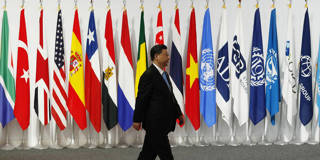 Kim Kyung-Hoon-Pool/Getty Images
Kim Kyung-Hoon-Pool/Getty Images
全球中国的价值
上海—在近40年的经济改革中,中国因为向世界打开国门而收获了巨大的奖励。融入全球经济——虽然这只是中国历史性全面转向市场机制的支持要素之一——让数百万中国人民摆脱了贫困,,也让中国成为(以购买力平价衡量)世界第二大经济体。并且我们的新研究表明,这一方针的潜力还远远没有耗尽
比如,中国贡献了11%的全球商品贸易,但只占全球服务贸易的6%。此外,中国银行、证券和债券市场规模均已名列世界前三,但外国实体只占总市值的不足6%。中国有110家全球财富500强公司,但只有五分之一的营收来自海外,而标普500公司的这一比例为44%。
在世界贸易趋于紧张之前,中国与世界的关系便已经开始改变。中国对世界其他国家的相对暴露——以贸易、科技和资本衡量——在2007年达到顶峰,此后一直下降,2000—2017年间总体呈现下降。这部分反映了中国经济日益强调内需——这一趋势在全球金融危机大幅减少了中国出口的外国需求之后愈演愈烈。
https://prosyn.org/MWb9fZczh
To continue reading, register now. It’s free!
Register Now
Already have an account?
Log in



上海—在近40年的经济改革中,中国因为向世界打开国门而收获了巨大的奖励。融入全球经济——虽然这只是中国历史性全面转向市场机制的支持要素之一——让数百万中国人民摆脱了贫困,,也让中国成为(以购买力平价衡量)世界第二大经济体。并且我们的新研究表明,这一方针的潜力还远远没有耗尽
比如,中国贡献了11%的全球商品贸易,但只占全球服务贸易的6%。此外,中国银行、证券和债券市场规模均已名列世界前三,但外国实体只占总市值的不足6%。中国有110家全球财富500强公司,但只有五分之一的营收来自海外,而标普500公司的这一比例为44%。
在世界贸易趋于紧张之前,中国与世界的关系便已经开始改变。中国对世界其他国家的相对暴露——以贸易、科技和资本衡量——在2007年达到顶峰,此后一直下降,2000—2017年间总体呈现下降。这部分反映了中国经济日益强调内需——这一趋势在全球金融危机大幅减少了中国出口的外国需求之后愈演愈烈。